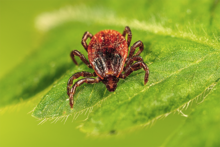With tick bites on the rise, College of Science and College of Public Health are collaborating to improve detection, diagnosis, and treatment with urine testing
George Mason University researchers have received a $1,176,645 grant in federal funding from the U.S. Department of the Army to revolutionize Lyme disease detection and diagnosis with urine testing. The College of Science and College of Public Health aim to harness the many advantages of urine testing over other methods and increase mainstream adoption.

“We have developed a urine test for Lyme disease that detects the bacteria (Borrelia species) that causes Lyme disease, making it a direct test to confirm an infection soon after the tick bite. This leads to earlier treatment when necessary and could prevent the long-term debilitating effects of the disease,” said Alessandra Luchini, systems biology professor in the College of Science and George Mason’s principal investigator.
The current standard of care test for potential Lyme disease is an antibody blood test, which measures the immune system response to the bacteria that cause Lyme disease. In contrast, the Mason test detects molecules derived from the bacteria themselves, which have the advantage of high specificity (accuracy) and early detection. The Mason test matches the exact amino acid sequences (the building blocks of the bacterial molecules) that are found only in Borrelia and not in other organisms. For example, one of the proteins the Mason scientists studied is part of the Borrelia flagellum, which allows the bacterium to move around the body.

In Mason’s clinical research trials, urine tests had a 90% true positive rate (sensitivity) and close to 100% specificity (true negative rate). Researchers will use banked samples from cross-sectional and longitudinal studies of acute Lyme patients from the Lyme Disease Biobank and banked specimens from Johns Hopkins University, respectively, who are recognized leader in clinical Lyme disease research.
Utilizing her 15 years of Lyme disease bacteria (Borrelia) research, Ashley Groshong, PhD, unit chief of the Bacterial Physiology and Metabolism Section of the National Institute of Allergy and Infectious Diseases, a part of the National Institutes of Health, is collaborating on the project by evaluating the suitability of diagnostic indicators based on bacterial physiology.
Additionally, the Mason study will pilot a collapsible urine collection cup shipped to a lab through the mail, making collection and diagnosis easier for more people to access through telehealth.

"A urine cup will offer a private, comfortable and convenient way to collect the sample at home without compromising the accuracy of the lab test,” said Lance Liotta, professor in the College of Science, co-director of Mason’s Center for Applied Proteomics and Molecular Medicine, and co-investigator on the study. “Shipped in a semi-dry state that will preserve target proteins and protects again specimen degradation, this approach will improve specificity which has been a weakness of previous testing approaches."
Lyme disease is the most common animal-to-human transmitted disease in the United States with approximately 476,000 people diagnosed and treated each year—and it is on the rise. If not treated quickly and properly, those bitten can suffer from prolonged symptoms (called Post-Treatment Lyme Disease Syndrome), such as concentration and memory issues, dizziness, fatigue, body aches, depression, and difficulty sleeping.

“This is a significant collaboration to advance diagnostics for Lyme disease. In my capacity as an epidemiologist, I am thrilled to work with Drs. Luchini, Liotta, and Espina, and Dr. Krall in her capacity as a biostatistician. This study will have a major impact on the timely diagnosis of Lyme,” said Melissa J. Perry, dean of the College of Public Health and co-investigator of the study.
This three-year study will take place in the same Mason CAP/CLIA Clinical Proteomics Laboratory that implemented the innovative saliva COVID test. The lab is run by Virginia Espina, who is a collaborator on the grant.
This work will be supported by the Assistant Secretary of Defense for Health Affairs through the Tick-Borne Disease Research Program, endorsed by the Department of Defense. Opinions, interpretations, conclusions and recommendations are those of the author and are not necessarily endorsed by the Department of Defense.
About George Mason University
George Mason University is Virginia’s largest public research university. Located near Washington, D.C., Mason enrolls more than 40,000 students from 130 countries and all 50 states. Mason has grown rapidly over the past half-century and is recognized for its innovation and entrepreneurship, remarkable diversity, and commitment to accessibility. In 2023, the university launched Mason Now: Power the Possible, a one-billion-dollar comprehensive campaign to support student success, research, innovation, community, and stewardship. Learn more at gmu.edu.
About the College of Science
Mason’s College of Science is a leader in scientific discovery and a creator of innovative solutions for the rapidly-changing needs of today’s world. The college prides itself in being home to a diverse population of more than 4,200 students and researchers serving as a magnet for all scientific minds. With new discoveries, our scientists continue to grow Mason’s portfolio of patents, licenses, partnerships, and spin off companies.
The college blends traditional science education with sought-after programs at all levels across a dozen departments to challenge and engage in disciplines including personalized medicine, infectious diseases, drug discovery, climate dynamics, environmental justice and conservation, materials science, astronomy, forensic science, computational science, and applied mathematics. Learn more at science.gmu.edu.
About the College of Public Health
Mason’s College of Public Health—the first College of Public Health in Virginia—enrolls more than 1,900 undergraduate and 1,300 graduate students in its nationally recognized programs, including six undergraduate degrees, eight master’s degrees, five doctoral degrees, and six professional certificate programs. Comprising the School of Nursing and the Departments of Global and Community Health, Health Administration and Policy, Nutrition and Food Studies, and Social Work, the college also conducts transdisciplinary research that seeks to understand the many factors that influence the public health and well-being throughout the lifespan. With more than 500 partners, the college serves the community and engages its students through research, practice, and clinical care.
In This Story

Related Stories
- February 13, 2026
- February 2, 2026
- February 2, 2026
- January 27, 2026
- January 26, 2026
